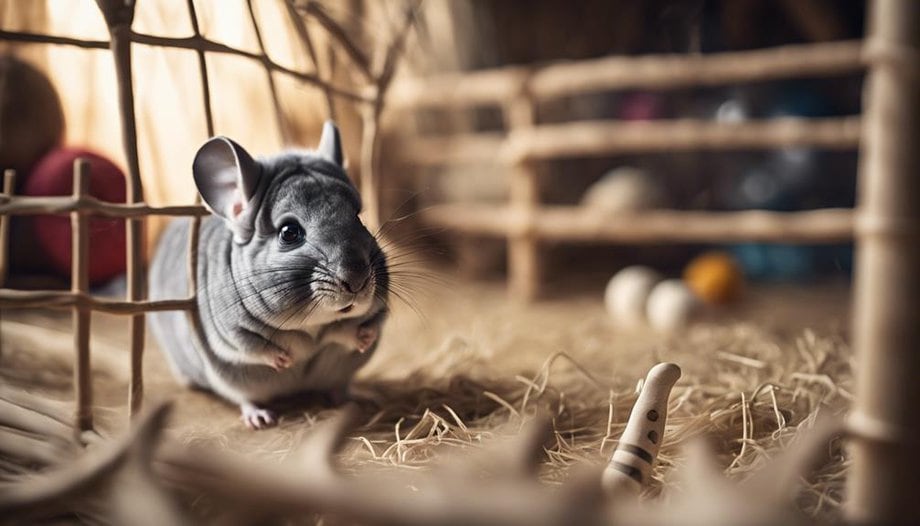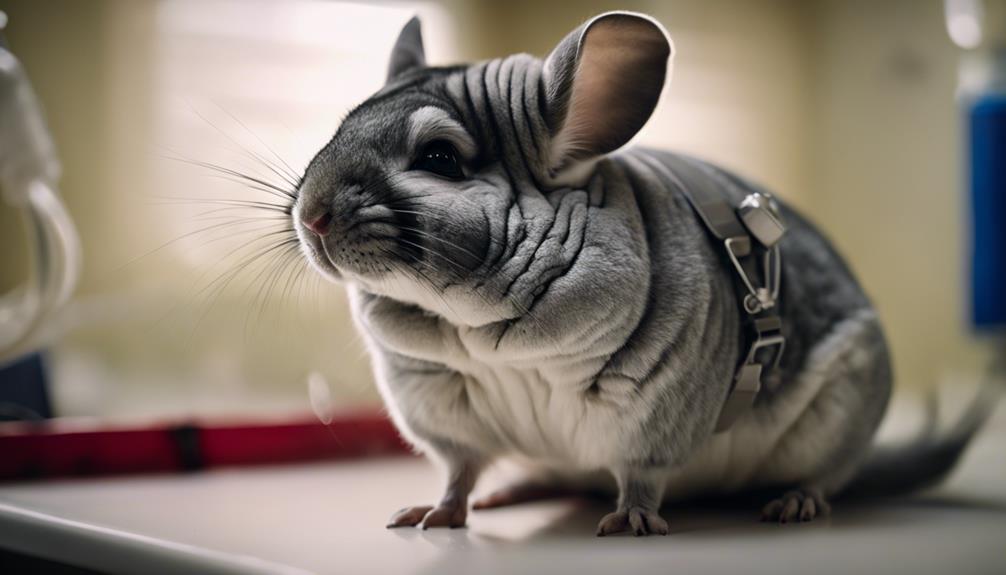How to Create a Stress-Free Environment for Chinchillas

Chinchillas are small, sensitive animals that thrive in a stress-free environment. To create the ideal living space for your chinchilla, start by providing a spacious cage with plenty of room to move around.
Include a dust bath for them to clean themselves, as well as chew toys to help keep their teeth healthy. Make sure to place the cage in a quiet area away from loud noises and direct sunlight.
Maintaining a consistent routine for feeding and handling your chinchilla can also help reduce stress.
By following these tips, you can ensure that your chinchilla is happy and healthy in their home.
Ideal Cage Setup
Designing the chinchilla’s cage layout with multiple levels and platforms can provide ample space for exercise and exploration. When setting up the cage, incorporating various cage decorations such as wooden chew toys, hanging hammocks, and tunnels can offer mental stimulation and encourage physical activity. Chinchillas enjoy climbing and jumping, so having different levels within the cage allows them to exhibit their natural behaviors.
When it comes to bedding options, chinchillas thrive in a cage with soft and absorbent bedding materials. Aspen shavings or paper-based bedding are excellent choices as they’re safe for chinchillas to burrow in and help maintain cleanliness. Avoid using cedar or pine shavings as they can be harmful to the chinchilla’s respiratory system. Additionally, placing a cozy nest box filled with hay provides a comfortable spot for rest and relaxation.
Proper Temperature and Humidity

Maintaining the appropriate temperature and humidity levels is crucial for ensuring the well-being of chinchillas in their environment. Chinchillas thrive in temperatures ranging between 60-70°F (15-21°C) and require humidity levels between 40-60%.
To achieve optimal temperature control, it’s important to place the chinchilla’s cage away from direct sunlight, drafts, or heating/cooling vents. Bedding options such as aspen shavings or dust-free paper-based bedding can help regulate temperature and absorb excess moisture.
Proper ventilation requirements involve ensuring adequate airflow within the cage without subjecting the chinchilla to direct drafts. A well-ventilated environment helps prevent the build-up of ammonia from urine, which can be harmful to chinchillas.
Monitoring the temperature and humidity levels regularly and making adjustments as needed is essential for creating a stress-free habitat for these sensitive creatures. By paying attention to these details, chinchilla owners can provide a comfortable and healthy living space for their furry companions.
Balanced Diet and Nutrition

Chinchillas require a balanced diet to maintain optimal health and well-being.
Nutritious chinchilla food plays a vital role, alongside the availability of fresh hay.
Proper placement of the water bottle is also crucial for ensuring hydration and overall nutrition.
Nutritious Chinchilla Food
Ensuring a chinchilla’s health and well-being hinges significantly on providing a well-balanced diet rich in essential nutrients. Chinchillas have specific food preferences and should be fed a diet consisting mainly of high-quality chinchilla pellets. These pellets are designed to meet their nutritional needs, including fiber for proper digestion. Alongside pellets, chinchillas should have access to fresh hay daily to support dental health and provide additional fiber.
When considering treat options, it’s essential to choose snacks that are safe for chinchillas, such as small pieces of dried fruits or vegetables. Be cautious with treats, as overfeeding can lead to obesity. Additionally, be mindful of any dietary restrictions your chinchilla may have to maintain their well-being and prevent health issues.
Fresh Hay Availability
To provide chinchillas with essential nutrients and support their overall health, ensuring fresh hay availability is crucial for maintaining a balanced diet and nutrition.
Hay storage plays a vital role in preserving hay quality. Storing hay in a cool, dry place away from direct sunlight helps maintain its freshness and prevents mold growth, which can be harmful to chinchillas. It’s recommended to store hay in a well-ventilated area to prevent moisture buildup.
When selecting hay for chinchillas, opt for high-quality timothy hay or orchard grass hay, as these are rich in fiber and essential for their digestive health. Providing a consistent supply of fresh hay ensures that chinchillas have access to the necessary nutrients for their well-being.
Water Bottle Placement
Placing the water bottle at an accessible height within the chinchilla’s cage encourages regular hydration and contributes to their balanced diet and nutrition. To ensure optimal health, it’s crucial to prevent drips by checking the spout regularly and adjusting the bottle if needed.
The water bottle should be securely attached to the cage to prevent spills and keep the chinchilla’s living area dry and clean. Experts recommend placing the water bottle at a height that allows the chinchilla to drink comfortably without straining.
Easy accessibility to the water bottle encourages the chinchilla to stay hydrated throughout the day, promoting overall well-being. By following these simple steps, chinchilla owners can support their pets in maintaining a healthy and stress-free environment.
Safe Chinchilla Toys and Accessories

When selecting toys and accessories for your chinchilla, prioritize safety by choosing items made from non-toxic materials that are free from small parts that could be ingested. Interactive playthings and enrichment items are great choices to keep your chinchilla mentally stimulated. Chew safe accessories are essential as chinchillas have a natural tendency to chew on things to keep their teeth healthy and worn down. Exercise wheels are also fantastic additions to encourage physical activity and prevent boredom. Below is a table highlighting some safe chinchilla toys and accessories:
| Category | Description | Benefits |
|---|---|---|
| Wooden Chew Toys | Made from safe, chewable wood | Promotes dental health and chewing fun |
| Hanging Hay Balls | Provide both play and nutrition | Encourages natural foraging behavior |
| Dust Bath Container | Essential for chinchilla grooming | Helps keep their fur clean and healthy |
| Running Wheel | Allows for exercise | Prevents obesity and promotes activity |
Regular Exercise and Playtime

Regularly engaging your chinchilla in physical activity and playtime is crucial for maintaining their overall health and well-being. Chinchillas are playful and active animals that need opportunities to exercise both their bodies and minds. Interactive toys such as tunnels, chew toys, and running wheels are excellent options to keep your chinchilla entertained and mentally stimulated.
Creating a consistent playtime routine is beneficial for your chinchilla’s mental health. Setting aside dedicated time each day to interact with your pet can help reduce stress and prevent boredom. Chinchillas enjoy exploring new environments, so consider setting up a designated play area with safe items for them to investigate.
During playtime, supervise your chinchilla to ensure their safety and to prevent them from ingesting any harmful materials. Allow them to run around, jump, and explore within a secure space. Remember to rotate their toys regularly to keep them engaged and prevent boredom.
Minimizing Noise and Disturbances

To ensure a stress-free environment for chinchillas, minimizing noise and disturbances is essential for their well-being. Chinchillas are sensitive creatures that can easily get stressed by loud sounds or sudden noises. Providing quiet hideaways within their enclosure can offer them a safe space to retreat to when they feel overwhelmed. Additionally, placing their cage in a peaceful area away from high traffic zones can help reduce the exposure to disruptive sounds.
Calming music can also have a positive effect on chinchillas, creating a soothing atmosphere that promotes relaxation. Soft classical music or nature sounds played at low volume can help in masking any potentially disturbing noises from the surroundings. This gentle background noise can contribute to a sense of tranquility, making chinchillas feel more at ease and content in their environment.
Veterinary Care and Monitoring

Minimizing noise and disturbances in a chinchilla’s environment can also help in facilitating smooth veterinary care and monitoring for their overall health and well-being. Regular check-ups are vital to ensure your chinchilla’s health is in top condition. During these check-ups, the veterinarian can address any concerns and provide guidance on proper hygiene practices to prevent illnesses. Stress triggers, such as loud noises or sudden movements, should be avoided to maintain a calm and relaxed atmosphere for your chinchilla.
| Regular Check-Ups | Hygiene |
|---|---|
| Schedule annual visits to the vet for thorough examinations and vaccinations. | Maintain a clean living environment to prevent the buildup of bacteria and parasites. |
| Monitor weight and behavior changes to catch any health issues early on. | Provide a dust bath for your chinchilla to keep their fur clean and prevent skin problems. |
Frequently Asked Questions
Can Chinchillas Be Trained to Do Tricks or Perform Certain Behaviors?
Chinchillas can indeed be trained to do tricks and perform behaviors through positive reinforcement. Engaging in enrichment activities like teaching them tricks not only stimulates their minds but also strengthens the bond with their owners.
How Can I Prevent My Chinchilla From Getting Bored or Feeling Lonely?
To prevent boredom or loneliness in a chinchilla, provide enrichment activities like interactive toys and socialization opportunities. Include cage accessories for stimulation. These elements can keep a chinchilla engaged, mentally stimulated, and reduce feelings of isolation.
Are There Any Specific Grooming Techniques or Practices That Are Important for Chinchillas?
Proper diet is crucial for chinchillas to maintain healthy fur and teeth. Regular dust baths help control oil and prevent matting. Providing exercise through playtime and a spacious cage is vital for their physical and mental well-being.
How Do I Introduce a New Chinchilla to My Existing Chinchilla(S) in a Stress-Free Manner?
When introducing a new chinchilla to existing ones, start by allowing them to interact in neutral territory. Use gradual supervised meetings to monitor their social dynamics. Employ bonding techniques like scent swapping and providing separate hiding spots.
What Are Some Common Health Issues or Illnesses That Chinchillas May Face, and How Can They Be Prevented or Treated?
Chinchillas may face health issues like dental problems, gastrointestinal stasis, and respiratory infections. Diet management and weight monitoring are crucial. Regular vet checkups and parasite prevention help maintain their well-being. Prompt treatment is vital for their health.











